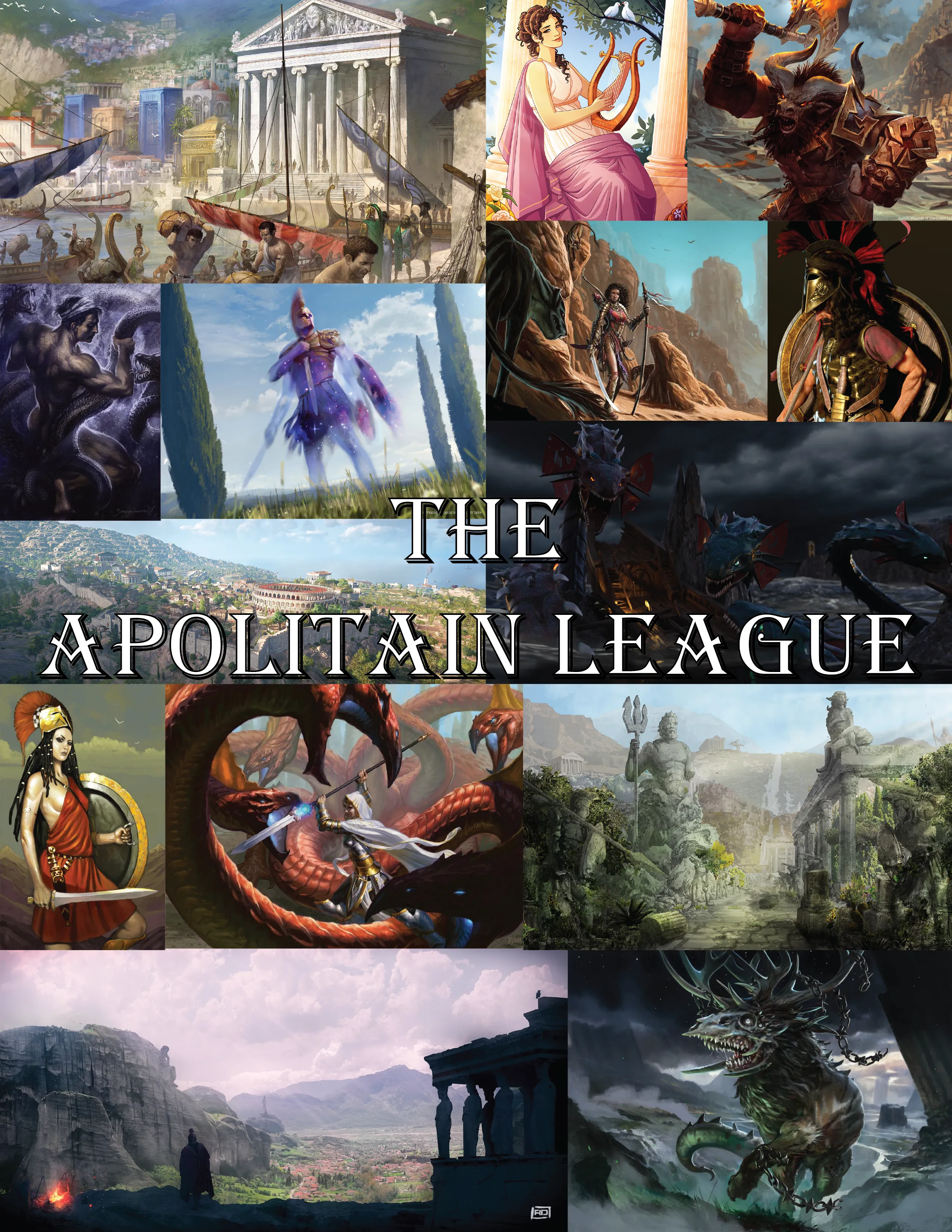The Apolitain League

History, Religion, State
The Apolitain League is a loose collection of City States which are championed by a local god. All the gods and cities are connected through Polita, the goddess of Civilization. Each of the local gods is said to be an aspect of the six Inheritors, the main six gods of the Apolitain League who precipitated the Nousogensis. The local gods often combine aspects of one or more inheritors.
Apolitains consider themselves the balance of so many other nations. For them, their gods are representative of local beliefs, powerful but not overbearing. As a nation they practice all things in moderation. To them the war like stance of Sarmania is too violent, the top-down command of Na-Keb is too stifling, the wild expansion of the Maurkim too risky and the complete rejection of Gods in Lycia as too chaotic. This neutrality has led to the alliance with the Free Minotaur Captains.
Given this moderation the presence of [[AsusA, God]] and [[Arkoz, God]] is confusing to the few Apolitains who try to understand theology. Since the Nousogensis, the birth of knowledge and toppling of the primordial forces that ruled the world before, these two titans have been the subject of some debate. AsusA represents sublime beauty and symmetry while Arkoz represents the purest despair of the human condition, plague, famine, death, imbalance. Most Apolitains however do not spend long pondering structure, they are much too busy with local politics and simple matters of living.
The league is set up as a representative republic with the 8 gods acting in the judicial role. Each settlement large enough to support a god sends two representatives, one chosen by that god, and the other by the people in an open vote. Those representatives meet in Polita, the capital city, to serve as legislators, they determine the direction the nation will take. There is a second branch of those chosen by the gods, in this branch each of the 8 gods gets a champion. This forms an executive branch responsible for enacting the will of the gods and people.
In the Apolitain league gods are a part of everyday life. A settlement or town will have a god who represents the values of the settlement they are a part of. This god will protect the settlement in return for offerings and devotion. A settlement on the edge of civilization might have a local god who embodies aspects of Techni, Theria and Theus. In the hierarchy of gods this new godling would be considered an aspect of the main three inheritors, altered to suit the needs, desires and values of the people who worship them. Most Apolitains have a good relationship with their local god, and with the major gods from who their local one derives aspects from.
With the gods so engrained in every-day life, the roles gods play in the world is in the forefront of every Apolitain’s mind. Good fortune can be directly attributed to the gods, while bad luck means the gods are displeased. Much time is spent trying to understand exactly what the gods want and working with them to make a new world. The practice of seeing an oracle is common among Apolitains wanting to understand what their future holds.
Stories from the age of heroes show gods and heroes working in tandem. Often a god will champion one who embodies the ideals of the god. Even-Handed Alexandria and her son wizened Timo were the first of Polita’s champions to unite the cities, creating the Apolitain league as it is today. The devices made by Industrious Hypatia with Techni’s guidance continue to help Apolitans in trade, home life and war. And Swift-footed Leandros and his brother Unseen Leto were the most decorated soldiers of the first Lycian war under Phonos and Theus.
Conflicts
This moderation and cooperation in The League however is balancing on a knife’s edge. Even now, dissidents from Lycia are coming south, spreading the message of Deicide and freedom. For some Apolitains this is appealing, the Gods are more oppressive when you live with the fear of the god itself ending your life for displeasing it. For some the message of overthrowing your masters has led to the 8 Champions being put under scrutiny. The gods are divine, but these champions were just normal people before they were chosen, and the people had no say in that. How are these Chosen better than despots, able to exercise their will on the populace.
The relationship with Maurkim to the south represents yet another knife’s edge. With Techni and Utim so close, the trading relationship being open is to the interest of all, however both nations have been slowly calling for more and more protections. The unaligned Minotaurs deepening the schism. This all has been culminating in a cold war on the seas with many wondering what will happen when the bridge is completed between these two cities. For some Apolitains this is letting the lion in to the flock, while for others this can be used to show those Maurkim who controls trade.
Phillosophy
The final world is one where all things are balanced. All creatures know joy and sadness in equal measure, all those who suffer want receive plenty in equal measure, and moderation is found in all things. The balanced role that the gods play help lead the Apolitains to this perfectly balanced future.